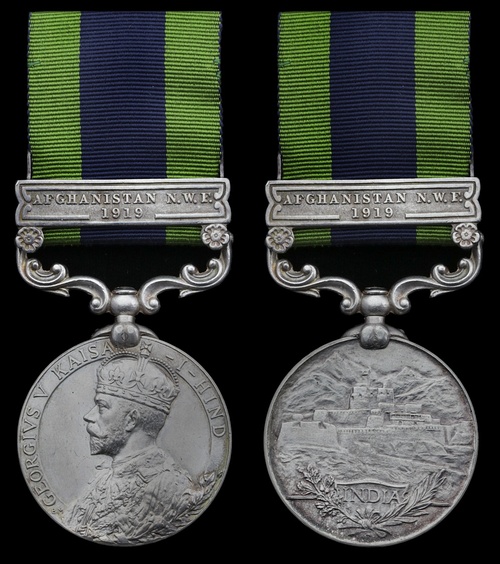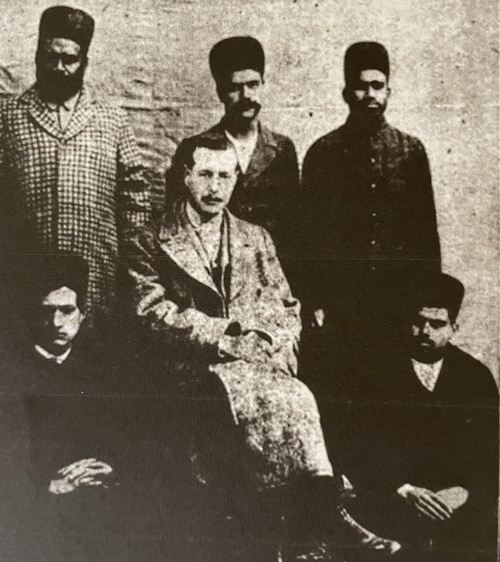Auction: 22002 - Orders, Decorations and Medals
Lot: 39
The India General Service Medal awarded to Surgeon-Major H. Crossle, C.I.E., Indian Medical Service, a well-travelled Doctor from the Emerald Isle who tended those suffering plague in Bombay in 1905; building and training local medics at his Consular Hospital in Persia whilst also jossling with local political unrest after he was left in charge of the Consulate, he died of blood poisoning in January 1919
India General Service 1908-35, 1 clasp, Afghanistan N.W.F. 1919 (Major H. Crossle, I.M.S.), nearly extremely fine
[C.I.E.] London Gazette 1 January 1919.
Howard Crossle was born on 4 December 1879 at Newry. Having attended Newry Intermediate School he qualified Bachelor of Arts, Bachelor of Medicine, Diploma in Surgery (Ch.B.) and Bachelor Artis Obstetricae, Trinity College, Dublin, 1901.
He was made a Lieutenant in the Indian Medical Service, 26 July 1902, part of the Bombay Command. Made Officiating Medical Officer of the 16th Bombay Infantry on 4 November 1902, he held the same post with the 42nd Deoli Regiment and Agency Surgeon at Haraoti and Tonk from 19 May 1905.
Made Captain in July 1905, Crossle transferred to Civil Employment but was ordered to Nasirabad, Bombay in July 1905 for which he was granted '...special mention for services rendered in connection with the outbreak of plague in that station.'
Appointed officiating Consular Surgeon at Khermanshah, Persia on 20 May 1906. In this period he set up a Consular Hospital, as recalled by the Newry Reporter:
'Captain Crossle has erected a Consular Hospital, to which a large number of both medical and surgical cases have been already admitted.'
Crossle had local hospital assistants and also trained local pupils who attended the wards for educational purposes. Whilst at Khermanshah, Crossle took Charge of the Consulate upon the leave of Captain Gough. In this period a local uprising occurred at which it appeared a massacre might be the result of the fighting between the factions under Seyyid Kamal-ed-Din, a Tehran priest and the armed band of Zahir-ul-Mulk. Crossle had permitted several refugees to seek safety in the grounds of the Consulate whilst in fear of their lives. As things appeared to be coming to a head, the Shah abdicated and the situation calmed. He also undertook a journey with the Vice-Consul through Bakhtiari country to Ispahan in the summer of 1906.
Crossle was made Officiating Agency Surgeon at Muscat, Oman, in 1910 and qualified (distinction) Diploma in Tropical Hygiene, London 1911. Advanced Major, January 1914, he took the Diploma in Public Health of the Royal College of Physicians and Surgeons (Ireland) in 1914 and a Diploma in Tropical Medicine and Hygiene, Cambridge that same year. He was an Agency Surgeon and Civil Surgeon in Hazara 1914-1919 and then Agency Surgeon and Civil & Jail Surgeon at Peshawar, and Medical Officer to the Mohmand Militia, from 15 October 1917. Crossle was Inspector-General of the Jail Department and Chief Medical Officer to the North West Frontier Provinces Government, 26 January 1919. Surgeon-Major Crossle died of blood poisoning, which he had suffered some two months prior at Peshawar on 26 January 1919. He did not wear the C.I.E. which had been duly awarded to him and is commemorated upon the Delhi Memorial; sold together with copied research.
Subject to 20% VAT on Buyer’s Premium. For more information please view Terms and Conditions for Buyers.
Sold for
£500
Starting price
£130







